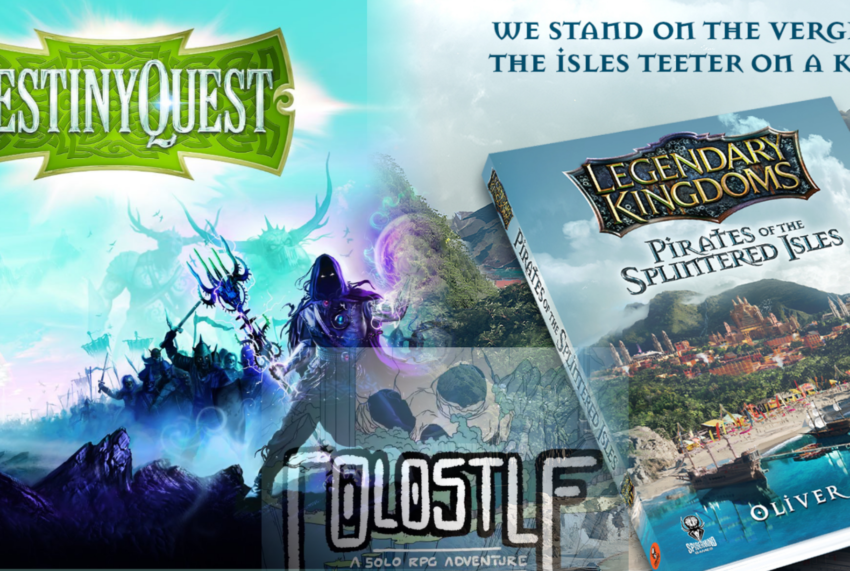What are solo gamebooks and why are they fun?
Gamebooks are interactive fiction that allow the reader to make choices that affect the outcome of the story. They are similar to choose-your-own-adventure books, but often have more complex storylines and may include elements like dice-rolling and statistics to determine the outcome of events. Solo gamebooks are a type of gamebook that can be played by a single person, without the need for other players. They are fun because they offer a unique form of interactive storytelling, where the reader gets to make decisions and shape the direction of the story. They can be a great way to pass the time and can be enjoyed by people of all ages.
Is it the same as SOLO RPG play?
No…and yes….
Solo gamebooks are similar to solo role-playing games (RPGs) in that they are both activities that can be played by a single person. However, they have some key differences.
In a solo gamebook, the reader makes choices that affect the direction of the story and follows a set path through the book, reading and making decisions as they go. Solo gamebooks are typically written as a series of branching storylines, with the reader making choices that determine which path they follow.
In a solo RPG, the player assumes the role of a character and makes decisions as that character in a fictional world. The player may use dice or other mechanics to determine the outcome of actions, and may have more freedom to explore and interact with the game world than in a gamebook. Solo RPGs can be played using pre-written adventures or by creating a custom game world and storyline.
Both solo gamebooks and solo RPGs can be fun, but they offer different types of gameplay and storytelling experiences.
What about new solo gamebooks like DESTINEY QUEST or FORGOTTEN REALMS, they use dice!
Destiny Quest and Forgotten Realms are both examples of solo gamebooks that use dice to determine the outcome of certain events. In these gamebooks, the reader makes choices as they progress through the story, and at certain points they may be required to roll dice to determine the outcome of an action or event. The use of dice adds an element of chance and unpredictability to the gameplay, and can make the experience more exciting and immersive.
Solo gamebooks that use mechanics like dice rolling and character statistics are often more complex than traditional choose-your-own-adventure books and can offer a deeper and more varied gameplay experience. They can be a great way for fans of tabletop RPGs to get a similar experience on their own, or for people who are interested in RPGs but don’t have anyone to play with.
So what are examples of basic older gamebooks?
Some examples of basic gamebooks are:
- Choose Your Own Adventure books: These are simple gamebooks that allow the reader to make choices that affect the direction of the story. They typically have a linear structure, with the reader making a choice at the end of each chapter and then following the corresponding path through the book.
- Fighting Fantasy books: These gamebooks are similar to Choose Your Own Adventure books, but often have more complex storylines and may include elements like dice-rolling and character statistics to determine the outcome of events.
- Lone Wolf books: These gamebooks are part of a series that follows the adventures of a character named Lone Wolf. They have a branching storyline structure and include elements like dice-rolling and character statistics.
- Tunnels & Trolls books: These gamebooks are part of a series that are set in a fantasy world and include elements like character creation, dice-rolling, and combat.
Basic gamebooks are often a good starting point for people who are new to the genre, as they typically have simple mechanics and straightforward storylines.
Can you tell me more about newer more complex gamebooks?
There are many newer gamebooks that are more complex than traditional choose-your-own-adventure books. These gamebooks often include mechanics like dice-rolling, character creation, and combat, and may have more in-depth storylines and a larger number of branching paths. Some examples of newer, more complex gamebooks are:
- Destiny Quest: This series of gamebooks includes elements like character creation, dice-rolling, and combat, and is set in a fantasy world.
- Legacy of Dorn: Herald of Oblivion: This gamebook is part of a series set in the Warhammer 40,000 universe and includes elements like character creation, dice-rolling, and combat.
- Dragon Warriors: This series of gamebooks is set in a fantasy world and includes elements like character creation, dice-rolling, and combat.
- The Mechanicum: This gamebook is set in the Warhammer 40,000 universe and includes elements like character creation, dice-rolling, and combat.
- The Forgotten Future: This gamebook is set in a science fiction world and includes elements like character creation, dice-rolling, and combat.
- Forgotten Realms: This series of gamebooks is set in the Forgotten Realms fantasy world and includes elements like party management, character creation, dice-rolling, and combat.
- Colostle: This gamebook is set in a science fiction world and includes elements like character creation, dice-rolling, and combat.
Newer, more complex gamebooks can offer a more immersive and varied gameplay experience than traditional choose-your-own-adventure books. They are often geared towards more experienced gamebook players or fans of tabletop RPGs.
All in all, solo gamebooks have been around for a long time and are actually making a comeback… if you haven’t started playing them yet… start. And, you’re welcome!
What are your thoughts?!


